The latest evidence and resources for allied health professionals and clinical support staff.
Please note, unlike the rest of our blogs, our ‘Evidence for Allied Health: new evidence and resources’ blogs will not be updated.
You can scroll through this page to see the following topics:
- News and events
- Chest physiotherapy for adults with pneumonia
- Communicating with young people in hospital
- COVID-19
- Decision aids
- Dementia
- End of life – communication
- Exercise for adults having maintenance dialysis
- Hip protectors
- Physical restraints
- Public health and the allied health professions
- Respiratory conditions
- Running injuries
- Screening for lung cancer
- Treating women with urinary tract infections
News and events
A free webinar for anyone making health decisions
Join us for a free webinar for anyone making health decisions on Thursday 20th October 2022, 7-8pm (BST) – Making health decisions: what’s best for you?
Brian, Heather and Sarah, who have had to make some big health decisions, in different circumstances, and Becky, a doctor and former GP, discuss their experiences and some important elements of making health choices. This session will be facilitated by our Patient Co-ordinator Emma Doble and Dr Rufaro Ndokera, a former Cochrane UK Fellow.
Chest physiotherapy for adults with pneumonia
The Cochrane Review Chest physiotherapy for pneumonia in adults, updated in September 2022, highlights a continued evidence gap, with only very low-certainty evidence from eight studies with 974 people. Only two studies were available to add from the last decade, while the other studies were done around 20 to 40 years ago.
Communicating with young people in hospital
We have updated our blog Communicating with young people in hospital: what matters? to include NICE guidance, developed with young people, and other resources.
COVID-19
Cochrane is continuing to produce new and updated reviews in response to the pandemic. We have blogged about many of them and this blog COVID-19 evidence: a Cochrane round-up brings together a large collection of evidence and resources, starting from when this evidence was first being produced in spring 2020.
Plus, we have two blogs on COVID-19 treatments:
Like the reviews themselves, all our blogs are updated to reflect new evidence.
The lead author of the recently-updated Cochrane Review on the accuracy Rapid, point‐of‐care antigen tests for diagnosis of SARS‐CoV‐2 infection (published July 2022) has blogged about it in Covid tests: how accurate are LFTs?
There is also a shorter version – Covid tests: how good are LFTs? A short blog.
Interventions to increase COVID‐19 vaccine uptake: a scoping review (published August 2022) has identified and mapped a variety of interventions for increasing COVID‐19 vaccine uptake or decreasing vaccine hesitancy. The authors say “Our results demonstrate that this is an active field of research with 61 published studies and 35 studies still ongoing. This review gives a comprehensive overview of interventions to increase COVID‐19 vaccine uptake and can be the foundation for subsequent systematic reviews on the effectiveness of interventions to increase COVID‐19 vaccine uptake.”
Other Cochrane resources on COVID-19
You can find Coronavirus (COVID-19) Special Collections here
Cochrane COVID-19 Podcasts offer short summaries of Cochrane COVID-19 reviews from the authors themselves. A good way to hear the latest Cochrane evidence in under 5 minutes each.
You can find Cochrane Clinical Answers related to COVID-19 here. Cochrane Clinical Answers (CCAs) provide a readable, digestible, clinically-focused entry point to rigorous research from Cochrane Reviews. They are designed to be actionable and to inform point-of-care decision-making. Each CCA contains a clinical question, a short answer, and data for the outcomes from the Cochrane Review deemed most relevant to practising healthcare professionals.
Decision aids
Our blog Decision aids: helping people make better healthcare choices has been revised and republished to include new evidence and resources.
Dementia
On the page Dementia: evidence, experience and resources you can find our blogs about different aspects of preventing and living with dementia. Many of them include research evidence and also reflections from people affected by dementia themselves or in supportive roles as carers, family members or health professionals. There are also links to helpful resources.
End of life care – communication
In the blog Talking about dying: better conversations at the end of life, Sarah Chapman, whose Mum died during the first lockdown, reflects on the text conversations she had with her Mum’s carer about her dying. She also talks about recent evidence on effective communication between health professionals, those who are dying and their families and about our need for knowledge of ordinary dying when many of us don’t witness a death until we are older adults ourselves. The blog also contains sources of information and support for both non-medical people and health professionals.
Exercise for adults having maintenance dialysis
Dr Rebecca Gould has written this blog Exercise training for adults having maintenance dialysis looking at recent evidence on exercise for adults having maintenance dialysis.
Hip protectors
Our blog Hip protectors: can they help break your fall and not your hip? was recently revised and republished to include NICE guidance along with the Cochrane evidence.
Physical restraints in hospital
The authors of the Cochrane Review Interventions for preventing and reducing the use of physical restraints of older people in general hospital settings (published August 2022) conclude that:
- “We are uncertain whether organisational interventions aimed at implementing a least‐restraint policy can reduce physical restraints in general hospital settings.
- The use of pressure sensor alarms in beds or chairs for people with an increased fall risk has probably little to no effect on the use of physical restraints.”
Public health and the Allied Health Professions
The latest implementation plans of the Public Health Strategic Framework for Allied Health Professions, intended to develop further the important role AHPs can play in public health, have recently been published by NHS England (June 2022) and the Scottish Government (July 2022). These follow the publication in 2019 of the UK Allied Health Professions Public Health Strategic Framework 2019 to 2024 by the four nations (England, Wales, Scotland and Northern Ireland).
Each country pledged to publish an implementation plan and so far NHS England and the Scottish government have just published theirs for 2022 to 2027:
NHS England. The Allied Health Professions (AHPs) Strategy for England 2022 to 2027: AHPs Deliver. NHS England; June 2022.
Scottish Government. Scottish Allied Health Professions Public Health Strategic Framework Implementation Plan 2022 to 2027. Edinburgh: Scottish Government; July 2022.
Respiratory conditions
Asthma
The Cochrane Review Pulmonary rehabilitation versus usual care for adults with asthma (published August 2022) found that “shows that pulmonary rehabilitation is probably associated with clinically meaningful improvements in functional exercise capacity and quality of life upon programme completion in adults with asthma.” The impact on asthma control and on maximal exercise capacity is uncertain.
Cystic fibrosis
The Cochrane Review Physical activity and exercise training in cystic fibrosis (August 2022) includes limited evidence from small studies. The authors say that they are “uncertain about the effects” and that “better-quality studies will likely change the findings”.
In the blog Cystic fibrosis and me: back to school (September 2014, updated 2022) nine year old Tess Griffin talked about managing her health at school.
Pulmonary rehabilitation and exercise training for adults with chronic respiratory conditions
Dr Becky Gould looked at exercise training in a blog on Pulmonary rehabilitation and exercise training for adults with chronic respiratory conditions (July 2021):
Running injuries – prevention
The Cochrane Review Running shoes for preventing lower limb running injuries in adults (published August 2022) has found that the evidence is very low- and low-certainty, so the effects of different types of running shoes on injury rates remain uncertain.
Screening for lung cancer
The authors of the Cochrane Review Impact of low‐dose computed tomography (LDCT) screening on lung cancer‐related mortality (published August 2022) conclude that:
“The current evidence supports a reduction in lung cancer‐related mortality with the use of LDCT for lung cancer screening in high‐risk populations (those over the age of 40 with a significant smoking exposure). However, there are limited data on harms and further trials are required to determine participant selection and optimal frequency and duration of screening, with potential for significant overdiagnosis of lung cancer.”
Look out for a forthcoming Evidently Cochrane blog on this topic.
Treating urinary incontinence in women
A new Cochrane overview of reviews Conservative interventions for treating urinary incontinence in women (published September 2022) has found that:
- pelvic floor muscle training (PFMT) is more beneficial than control for all types of urinary incontinence for outcomes of cure or improvement and quality of life
- if PFMT is more intense, more frequent, with individual supervision, with/without combined with behavioural interventions with/without an adherence strategy, it is probably more effective.
- for cure or improvement, cones are more beneficial than control (but not PFMT) for women with stress urinary incontinence
- electrical stimulation is beneficial for women with urgency urinary incontinence
- weight loss results in more cure and improvement than control for women with all types of urinary incontinence combined.
Join in the conversation on Twitter with @SarahChapman30 and @CochraneUK or leave a comment on the blog.
Please note, we cannot give medical advice and do not publish comments that link to individual pages requesting donations or to commercial sites, or appear to endorse commercial products. We welcome diverse views and encourage discussion but we ask that comments are respectful and reserve the right not to publish any we consider offensive. Cochrane UK does not fact-check – or endorse – readers’ comments, including any treatments mentioned.
Sarah and Selena have nothing to disclose.

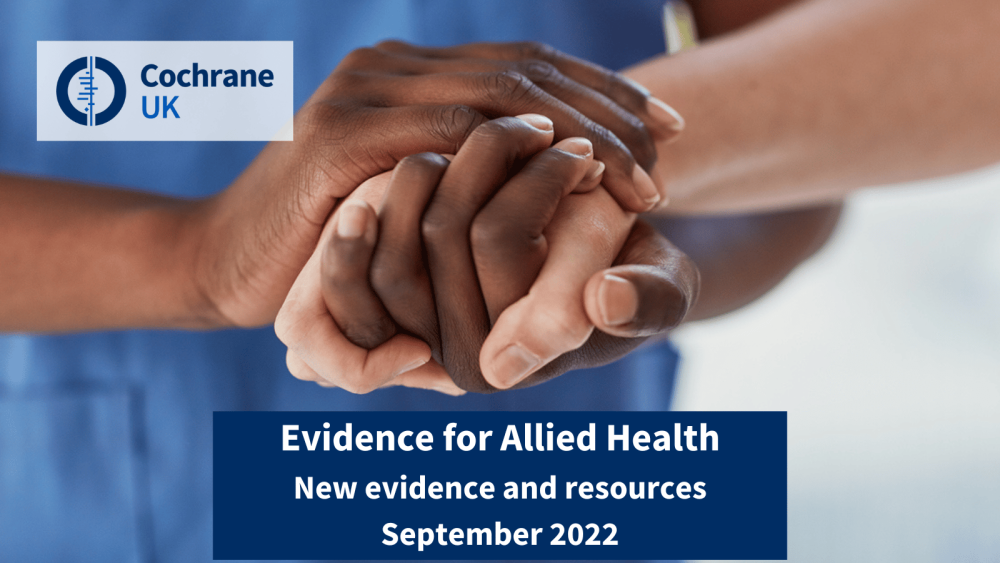

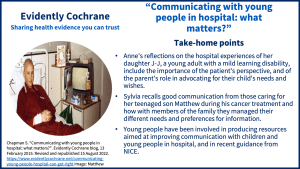
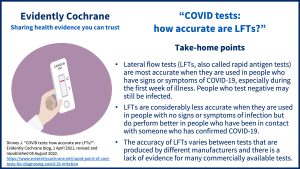
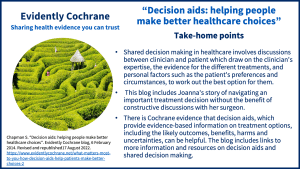
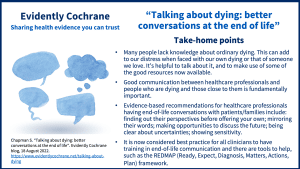
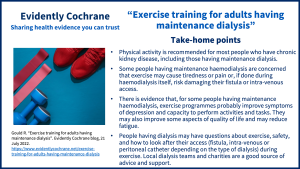
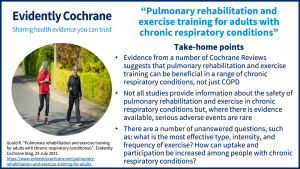

Excellent compilation of new evidence and resources for allied health professionals! This blog post showcases the importance of staying up-to-date with the latest research to enhance patient care. The inclusion of diverse disciplines and practical resources makes it a valuable reference for allied health practitioners. Well done!